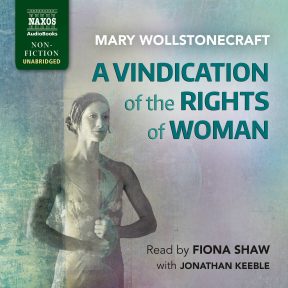The NAB Blog
Mary Wollstonecraft – The Mother of Feminism?
By Anthony Anderson
2 March 2016
 Mary Wollstonecraft’s A Vindication of the Rights of Woman is a classic text in the history of feminist writing and led to her being known in some circles as the ‘mother of feminism’. Its publication was preceded by two major events: the first, a new French Constitution in 1791 (following on from the French Revolution two years earlier) by which women were completely excluded from public life; and the second, the report by Charles Maurice de Talleyrand-Périgord to the French National Assembly which, though advocating public education, also proposed that education of girls should be restricted solely to domestic matters.
Mary Wollstonecraft’s A Vindication of the Rights of Woman is a classic text in the history of feminist writing and led to her being known in some circles as the ‘mother of feminism’. Its publication was preceded by two major events: the first, a new French Constitution in 1791 (following on from the French Revolution two years earlier) by which women were completely excluded from public life; and the second, the report by Charles Maurice de Talleyrand-Périgord to the French National Assembly which, though advocating public education, also proposed that education of girls should be restricted solely to domestic matters.
It is to Talleyrand-Périgord that Wollstonecraft dedicated A Vindication, and, near the beginning of the work, she urges him to reconsider his thoughts on the education of girls. One of her chief arguments is that a woman has to be prepared through education to become the companion of man:
Contending for the rights of women, my main argument is built on this simple principle, that if she be not prepared by education to become the companion of man, she will stop the progress of knowledge, for truth must be common to all, or it will be inefficacious with respect to its influence on general practice.
In the ensuing chapters, Wollstonecraft goes on to argue in favour of equality for women not only in the educational and political spheres but also in a social context: not only would a revision of women’s roles in society and public life lead to the greater good – a ‘true’ civilisation–, but the stereotypical notions of feminine virtue which are embedded in society must be rejected as both unnatural and undesirable. She repudiates the prevailing concept that women are incapable of reason and are ruled by their passions: if educated in the same way as boys, then girls could go on to possess and exercise just the same kind of reason, and indeed careers, as their male counterparts.
Wollstonecraft was a member of the more radical part of the Enlightenment movement and there seems to be a sense of some disappointment with what followed the French Revolution, itself underpinned by the reason and rights of the human being. The interests of girls and women seemed to be excluded from this new order and this lack of equality had been reinforced in post-revolution writing by the likes of Edmund Burke.
To many of us in the 21st century it seems preposterous that Wollstonecraft’s thinking could be anything other than mainstream. However, while A Vindication of the Rights of Woman met with great acclaim in radical political circles, it was also the subject of fierce hostility by conservative elements in society. Horace Walpole notably dubbed Wollstonecraft ‘a hyena in petticoats’. But inequality between men and women persists, even in ‘enlightened’ Western society. Mary Wollstonecraft’s influence has, nevertheless, been profound – it was Virginia Woolf who said of her that ‘she is alive and active, she argues and experiments, we hear her voice and trace her influence even now among the living.’
Our new audiobook of A Vindication of the Rights of Woman is read by the celebrated actor and director Fiona Shaw, and is released to coincide with International Women’s Day on 8 March.
« Previous entry • Latest Entry • The NAB Blog Archive • Next entry »